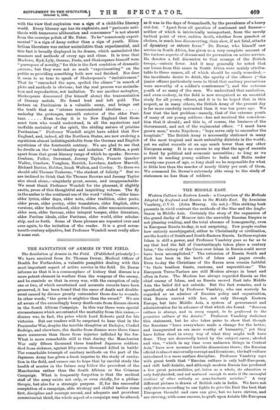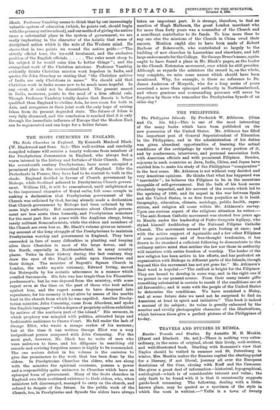THE MIDDLE EAST.
Western Culture in Eastern Lands : a Comparison of the Methods Adopted by England and Russia in the Middle East. By Arminius Vambery, C.V.O. (John Murray. 12s. net.)—This striking book presents in vivid contrast the methods of the Slav and the Anglo- Saxon in Middle Asia. Certainly the story of the expansion of the grand duchy of Moscow into the unwieldy Russian Empire is not pleasing reading, and the total absence of homogeneity, even in European Russia to-day, is not surprising. Few people realise how entirely unsubjugated, either to Christianity or civilisation, are the hordes of South and South-Eastern Russia. In these regions Islam is still a power, and Professor Vambery goes so far as to say that bad the fall of Constantinople taken place a century later," the victory of the Cross over Islam in Russia could never have been accomplished." The extension of Russia South and East has been in the teeth of Islam and pagan creeds. Even to-day the Christians of the Kazan area remain faithful "to their heathen feasts, customs, and superstitions." The European Turco-Tartars are still Moslem always in heart and often in form. The Moslem has always regarded Russia as the chief enemy of Islam, and as Russia moved East into Middle Asia the belief did not subside. But the fact remains, and is specifically stated by Professor Vambery, who can scarcely be regarded as an admirer of Russian policy and organisation, that Russia carried with her, not only through Eastern Europe, but into Middle Asia, a system of government and administration far in advance of that which she found. "Russian culture is always, and in every respect, to be preferred to the primitive culture of the Asiatic." Professor Vambery italicises this statement, but he also takes pains to show that though the Russians "have everywhere made a change for the better, and inaugurated an era more worthy of humanity," yet they have fallen short in every way of what they might well have done. They are deservedly hated by the subject races ; alcohol and vice, "which in my time were unknown things in Central Asia," have now assumed terrible dimensions there ; the Russian official is almost universally corrupt and licentious; the half-culture introduced is a mere surface discipline. Professor Vambery says with great truth that "Russian culture is only half-European, and still half-Asiatic, and although modern Russia has produced a few great personalities, yet, taken as a whole, its education is only half-finished, and not +natured enough to make it the successful civiliser of other entirely or semi-barbaric societies." A very different picture is drawn of British rule in India. We have not only striven according to our lights to give the East the best that European thought and care can give, but we have striven, and are striving, with some success, to graft upon Asiatic life European ideals. Professor Vambhy seems to think that by our increasingly valuable system of education (which, he points out, should begin with the primary native school), and our method of giving the native races a substantial place in the system of government, we are really implanting in the character of the Asiatic that sense of disciplined action which is the note of the Western mind. He shows that in two points we wound the native pride :—" The strictly official tone, the ice-cold treatment, and the exclusive position of the English officials The ruler must stoop to his subject if he would raise him to better things " ; and the evangelical work of the Christian missions. Professor VambSry evidently thinks Christian mission work hopeless in India, and quotes Sir John Strachey as stating that "the Christian natives of India are only Christians in name." We should add that Christian work in India seems now to be much more hopeful. In any event, it could not be discontinued. The present unrest in India, moreover, points to the need of a firm official rule. Though Professor Vambery totally denies that Russia is better qualified than England to civilise Asia, he sees room for both in Asia, and recognises in their joint work the only hope of raising Islam from its present degraded state. The future of Islam is very fully discussed, and the conclusion is reached that it is only through the immediate influence of Europe that the Moslem East can be regenerated and can hope for a better future.































































 Previous page
Previous page